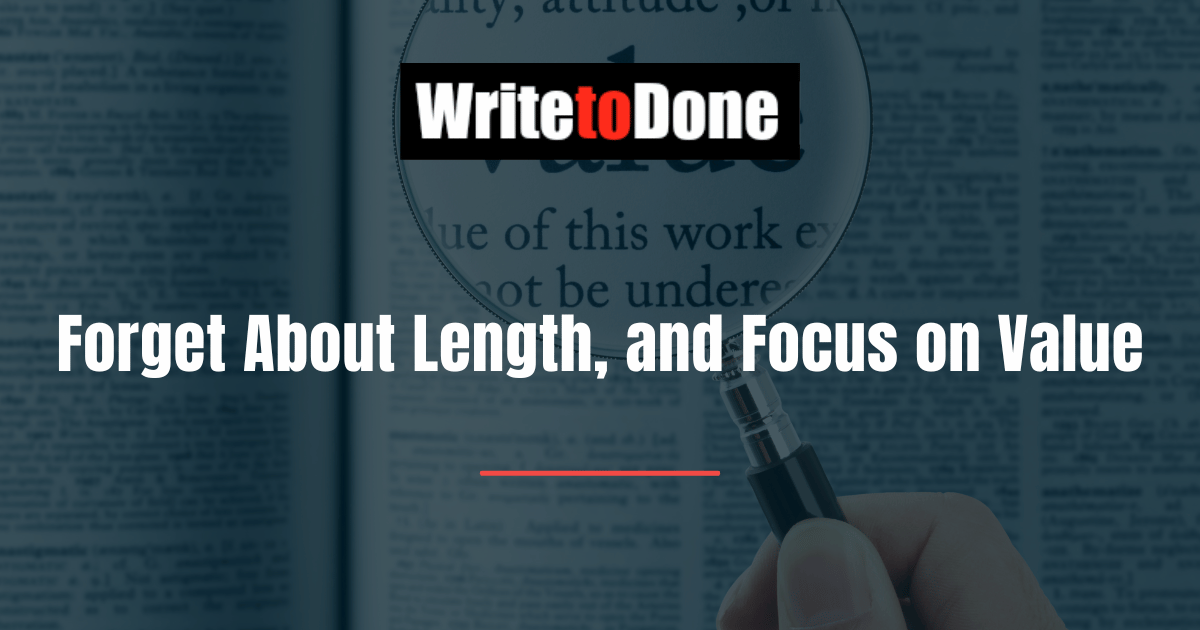What do you focus on?
You know what words really annoy me. I mean, really piss me off?
Word count.
I hate it. I hate that it gets so much of our attention in the online world.
Have you ever heard that a blog post should never be more than 500 words? I hear people say this all the time.
The reason is that people have short attention spans and need to be fed a dollop of information quickly, with minimum chance of distraction.
Is this true? I don’t believe so. Not by a long shot. But some pretty notable people do; and “conventional” wisdom disagrees with me.
Let’s look at both sides, then I’ll tell you what I have found to be true, and why.
Longer is Better
500 words is barely enough time to really identify an issue, let alone spend any time discussing it.
And yet the web is full of short, snappy, basically useless blog posts, because people are so frightened of scaring off or boring their readers.
If you think your writing is so bad that it only deserves 500 words worth of time from your reader, stop now. Find another line of work.
My writing is worth more attention than that, and so is yours.
But Shorter is Better Too
It’s been said by a smarter man than I that brevity is the soul of wit.
Besides, is there anything more annoying than a bloated piece of writing that uses one paragraph to make a point and the following twelve to beat it to death? It’s like being back in high school, scrambling for fillers to make your ten-page quota.
If something can be said quickly and succinctly, it should be. Especially because there are so many distractions online waiting to steal readers’ attention.
Why risk it?
Enough Already… Who Cares About Length? Think About Value!
Is there a clear winner in this debate?
I don’t think so.
There’s no point in getting hung up on word length when the important thing is providing value.
Pieces of any length provide value. That’s why we have, and appreciate, Haiku AND academic treatises.
More specifically for the web, writing should be exactly as long as it needs to be to deliver great value – but no longer.
So forget about the length of your piece and focus on making every sentence as value-packed as you possibly can.
No one is going to stop reading after 500 words if they’re interested in what you’re saying. They’ll want more!
By the same token, when you’re long-winded, people will stop reading, maybe before they get to your point.
Neither of these alternatives is acceptable for someone with something to say.
Guarantee Value at ANY Length
Most non-fiction writing has, at its core, a simple goal: identifying a problem and offering a solution.
This holds true across topics and industries.
To get more information about an issue that matters to them is why most people read non-fiction at all. (Fiction and poetry and other genre writers take note – the people you write for have issues that need to be addressed, and if you can do that for them, they will be that much more likely to believe you can also tell a good story!)
You can provide even more value by examining the roots of problems and what steps can be taken to fix them, but when you try to cover all that, it can be challenging to walk the line between too short and too long.
A System for Value?
Here’s where non-narrative writing like blog posts can take a lesson from fiction: introduction, rising tension, conclusion.
In this case, introduction is talking about the problem, rising tension is identifying the roots of the problem and conclusion is what can be done about it.
It can take a little practice to get used to framing your work in this way, but it is the surest way to guarantee value without leaving anything out or droning on ad infinitum.
That’s the reason I developed Write Like Freddy – to make it fast, effective and easy to provide value-packed blog posts every single time, and use them to further online careers.
About the author:
Danny Iny (@DannyIny) is the co-founder of Firepole Marketing, the “Freddy Krueger of Blogging”, and the co-author (with Guy Kawasaki, Brian Clark, and many others) of Engagement from Scratch! (available on Amazon, or as a free download). The latest and greatest thing you can get from him (for free, of course) is his Naked Marketing Manifesto, about marketing that really works!
Image: Focus on Qualitycourtesy of Bigstockphoto.com
















